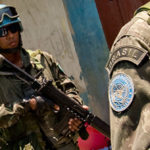Most studies on social capital examine the impact of social capital variables on particular development outcomes. There are few studies that provide evidence of the impact of development assistance on social capital, and even less that focus specifically on Sudan and more widely on Central and East Africa. A common theme among the available studies from the regions is the ...» more
Peacebuilding
Truth Commissions
Political backing is integral to the success of a truth commission. It is often presumed that national governments that have themselves established truth commissions (either by presidential decree or through legislation) will be supportive of them. This, however, has not always been the case. Where political will is absent, the work and impact of the commission is frequently ...» more
Transitional Justice and Reconciliation – Zimbabwe
On the 15th of September 2008, ZANU-PF and the two MDC formations signed the Global Political Agreement (GPA), intended to break the deadlock following the March 2008 elections. The agreement is silent on transitional justice, although it does include the provision to “give consideration to the setting up of a mechanism to properly advise on what measures might be necessary ...» more
Reintegration Best Practice
The following ‘lessons learned’ in relation to reintegration are repeated across the literature:Reintegration is a long process and programmes must be part of a wider security sector reform strategyReintegration should be nationally led and take a participatory approach, including various stakeholders.Planning for reintegration should begin early.Clear selection criteria should ...» more
Mainstreaming Peace and Conflict Prevention in Zimbabwe
There are few resources detailing how peacebuilding, conflict prevention and conflict resolution have practically been integrated into developing and humanitarian programming in Zimbabwe. However the Zimbabwe literature is in-keeping with the general literature in that it talks about: a) governance; b) education; and c) developing the capacities of staff within these sectors. ...» more
Peacebuilding Commission
The Peacebuilding Commission (PBC) is an intergovernmental advisory body, which formally came into existence in June 2006. The PBC, the Peacebuilding Support Office (PBSO) and the Peacebuilding Fund (PBF) comprise the UN’s new peacebuilding architecture. ‘The PBC (and by extension, the PBF and PBSO) were designed to:bring sustained attention to the pressing needs of countries ...» more
The World Bank in Fragile States
Some of the recurring findings from the literature on the World Bank’s performance in fragile and conflict-affected states include the following:Despite efforts to become more conflict-sensitive, the Bank’s approach to conflict-affected and post-conflict states focuses more on ‘doing things differently’ than ‘doing different things’. This is partly due to a continued reluctance ...» more
Fragile states
This Topic Guide introduces some of the best literature on state fragility and the challenge of aid effectiveness and lessons learned from international engagement in these contexts. It highlights the major debates in the international development and academic community on understanding and responding to fragile situations. It is intended primarily as a reference guide for ...» more
Peacebuilding and Access to Justice in Sri Lanka
Since the signing of a ceasefire agreement in 2002, many donors have sought to facilitate the peace process through peace conditionalities, i.e. the provision of aid tied to commitment to conflict resolution and peace. Much of the literature stresses, however, that political and diplomatic actors and processes and efforts to address structural causes of conflict are also ...» more
Aid Interventions on Gender and Conflict
Many experts point out that the impact of aid interventions on gender, especially in post-conflict settings, is rarely measured. Most of the literature on aid programmes that is available often takes a more critical perspective, with a view to suggesting what could have been done better. As a result, there is relatively more information on the strategies which are considered ...» more
Reintegration in Aceh/Post-conflict Environments
The situation in Aceh differs from other conflict environments in that most combatants have remained close to their communities during the conflict, with some never having left their villages. As such, minimal tensions are reported between former combatants and ‘receiving communities’. Reintegration measures have thus focused more on economic reintegration rather than social ...» more
Politics of Justice Sector Reform
There are a wealth of case studies available that discuss the impact of politics on justice reform, with less available on how justice reform impacts politics. Most of the resources identified demonstrate how the macro-political environment impacts on the justice sector or explore political dynamics within the sector that affect reform. Less material was found that discusses ...» more
Stability and Development in Sudan – Three Areas
While there has been progress in the Three Areas (relative peace and stability; economic recovery in agriculture; the return of skilled and educated refugees and IDPs), the region remains volatile. Security is still an issue and the presence of land mines hinders recovery and development. Distrust of central government has persisted.The inadequate state of social services and ...» more
Post-Conflict Recovery
There has been a push in recent years towards greater coordination and pooled financing mechanisms to promote sustainable post-conflict recovery. Donor coordination is facilitated through negotiated strategic frameworks, which articulate a shared vision, action plan and productive division of labour; and through common needs assessments. Pledging conferences have been ...» more
Economic Development and Peace in the Middle East
The development and conflict literature has noted links, generally, between economic development and stability/peace. However, there are few resources that focus specifically on this connection in the Middle East. This is, in part, because there are many other dimensions to stability/peace in the region beyond economics, such as continuing violent conflicts and occupation, ...» more

